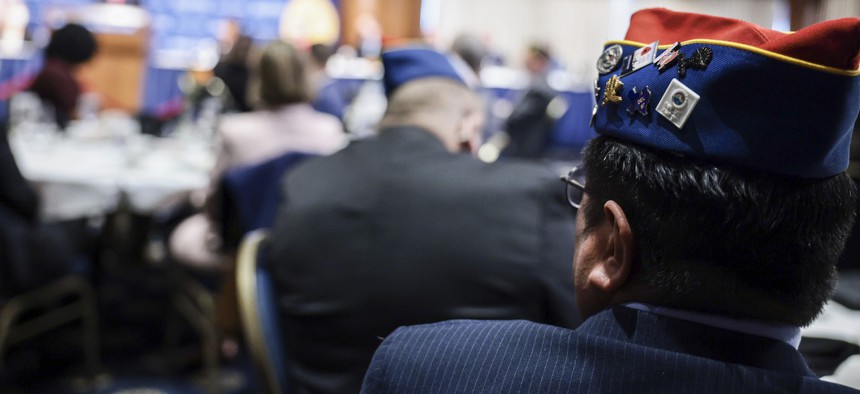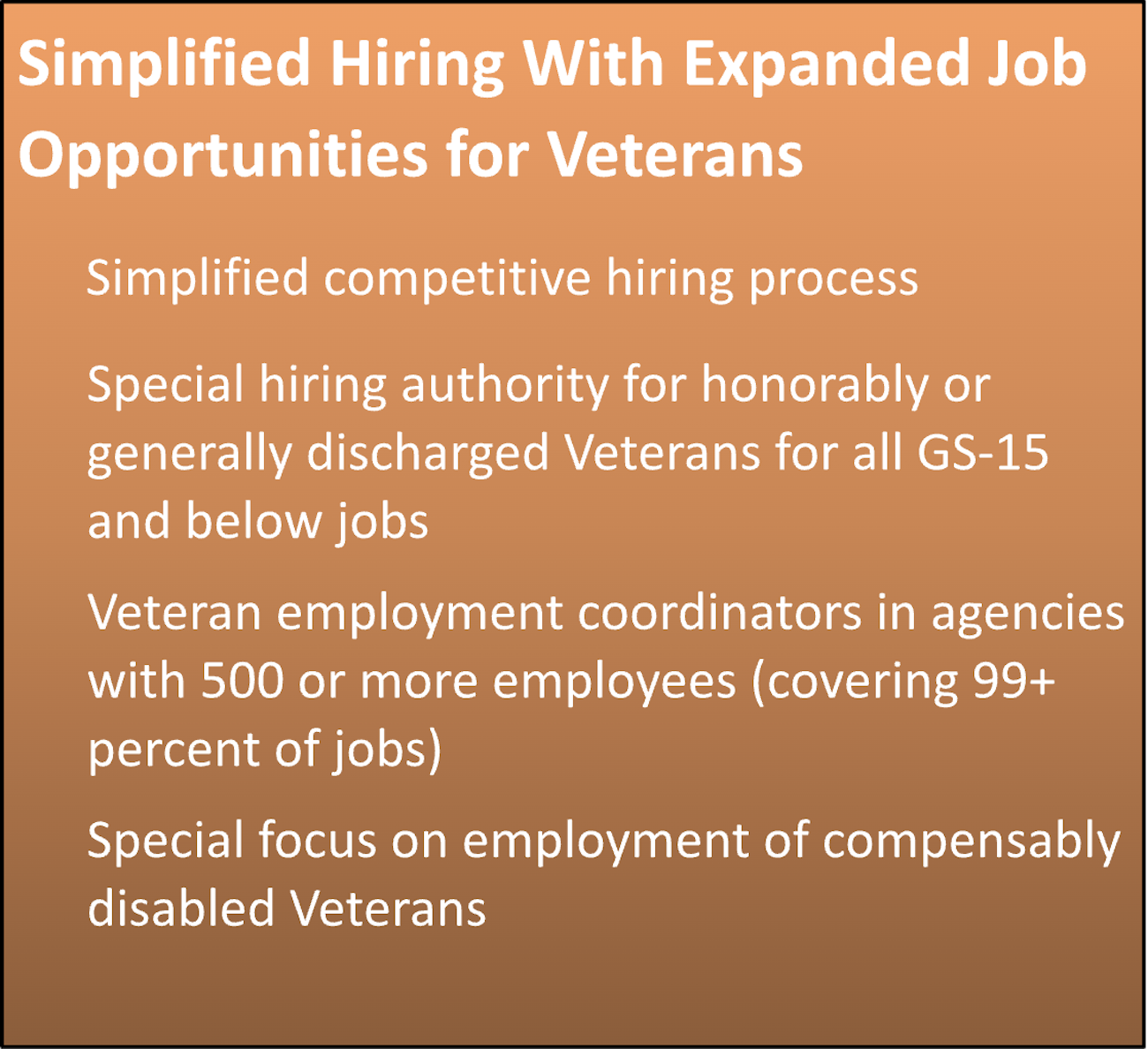
Agencies with 500 or more employees would be required to establish full-time veteran employment coordinators. Anna Moneymaker/Getty Images
The Federal Government Can Expand Opportunities for Veterans and Simplify Hiring, Too
A less complex hiring process that puts merit front and center would eliminate the need for most of the 102 or more hiring authorities currently in place.
Editor’s note: This is the third in a five-part series from the National Academy of Public Administration looking at the challenges and urgency of modernizing the civil service. Find the Academy’s full essay on the merit system here.
Would it surprise you to learn that not all veterans receive a preference for hiring? Or that there are more than 100 hiring authorities, including some for specific agencies to deal with specific issues, and others designed with the sole intent of helping agencies navigate the complex federal hiring rules, including the application of veterans’ preference?
The federal hiring process is a culmination of decades of litigation, legislation, special interests and perceived inequities. To fully appreciate just how complex it is, look at the 351-page Delegated Examining Operations Handbook from the Office of Personnel Management. While Human Resources Specialists must have a thorough understanding of all of the content in the handbook, hiring managers are often left scratching their heads over the guidance they receive to hire qualified people, and applicants are even more puzzled by a process that makes one feel that a PhD in astrophysics is needed to navigate what should be a simple “click and apply” process.
The problem is neither the guidance nor the people who wrote it, but rather the processes the handbook describes. What reasonable person would set out to design a system that confuses applicants, hiring managers, and even the human resources specialists who must interpret these 351 pages of rules and agency policies that govern hiring?
The National Academy of Public Administration strongly supports the goal of simplifying the competitive hiring process, while also ensuring significant agency hiring for our nation’s veterans. If we want to base hiring on merit and on the mission requirements of agencies, veterans’ preference as we know it does not do the job. That process might be worth it if it provided opportunities for all veterans, but it does not. It leaves out many veterans, focuses on preference rather than mission, and creates most of the complexity in the hiring process.
Our Working Group of Fellows strongly supports providing preference to veterans in a way that opens opportunities for all veterans and people with derived Veterans’ preference (such as surviving spouses) and ensures the hiring of the most qualified individuals based on their experience, skills, education, and performance history.
Generally, veterans who did not receive a Purple Heart or serve during wartime or a recognized military campaign do not receive preference, nor do those who retire at the rank of Major or equivalent and above. Veterans who apply for most professional positions also do not have preference. Veterans who serve right out of high school and exit the service during their 20s have preference, but few federal jobs are targeted at their skill sets and even fewer offer significant promotion opportunities. As a result, young veterans still suffer from unemployment at twice the rate of older veterans and all non-veterans. Moreover, once hired by the federal government, veterans leave government service at a significantly higher rate than non-veterans. Most veterans who enter military service now will not have preference under the existing rules.
The Solution

We believe the best solution is to simplify the competitive hiring process and provide veterans’ preference via a special hiring authority for all veterans, except those who retire at the rank of Major or equivalent and above, coupled with statutory requirements to develop and execute veteran hiring programs in all agencies with more than 500 employees.
This proposal would replace the current approach to veterans’ preference by granting every agency special hiring authority for veterans with an honorable or general discharge for all positions for which they are qualified at grades GS-15 or equivalent and below. Veterans would also be allowed to apply for merit promotion announcements regardless of the area of consideration in such announcements. OPM would issue regulations to implement the new processes to ensure that job opportunities for veterans are announced on job boards, at hiring fairs, on college campuses, or at other venues that would provide opportunities for substantial numbers of Veterans to apply. Hires would be based on merit. The extensive “Public Notice,” as prescribed in 5 U.S.C. § 3327 and § 3330, would not be required.
To ensure that agencies do not stop hiring veterans, our proposal requires agencies to maintain at least the 2022 percentage of veterans in their workforce, unless granted an exception by OPM due to a lack of qualified Veterans in the labor market or a national emergency. Given that the new hiring authority simplifies and greatly expands opportunities for veteran hiring, there should be few excuses for not maintaining at least the current numbers of veterans in the workforce.
Agencies with 500 or more employees would be required to establish full-time veteran employment coordinators, reporting to the agency chief human capital officer, who would be responsible for developing, implementing, and administering a comprehensive veteran employment program in the agency. The 500-employee threshold covers more than 99%t of federal jobs. Agencies would be held accountable for exercising this new authority and providing significantly enhanced opportunities for veterans. We recognize the special debt owed to veterans whose service resulted in a disability and propose a statutory requirement to identify barriers to employing disabled veterans and ways to create opportunities to hire and provide career advancement opportunities to disabled veterans. Agencies would be directed to establish developmental programs that would allow veterans (such as infantry soldiers) whose service-developed skills may not translate easily to civilian employment to enter career programs with significant promotion potential.
An agency that backslides in veteran employment could be placed on an improvement plan overseen by OPM. We do not propose changing the use of Veterans’ preference in reductions in force.
While we do not propose immediately eliminating the plethora of competitive hiring authorities, most would no longer be necessary. Replacement of the current veterans’ preference process with the special hiring authority would dramatically simplify the competitive hiring process. Over time, OPM and Congress could eliminate most of the 102 or more hiring authorities currently in place, leaving a far less complex hiring process that puts merit front and center.
Benefits
This approach simplifies hiring for everyone. It enhances and expands veterans’ preference by providing a special hiring authority for veterans with honorable or general discharges (except those who retired at the rank of Major or equivalent and above). It also provides protections to ensure agencies do not backslide in their employment of veterans. At the same time, the proposal would eliminate the maze of hiring processes and bureaucratic hurdles jobseekers and agencies must currently navigate. Complexity would be swept away, replaced with an easy-to-understand process that puts merit front and center.
Jeffrey Neal and Angela Bailey are former chief human capital officers for the Department of Homeland Security, and Fellows of the National Academy of Public Administration.
NEXT STORY: OPM Supports Transgender Feds in New Guidance






